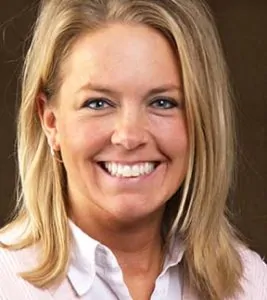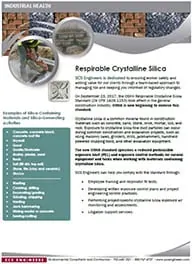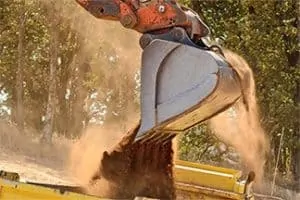

See SCS Engineers Construction Services
Join SCS Engineers professionals, including our National Landfill Expert, Betsy Powers, for the Solid Waste Landfill Design Course, April 1-3 at the Pyle Center in Madison, WI.
During the course you will have the opportunity to learn about the critical factors of solid waste landfill design, operations, evolving industry issues, and economics. Learn from expert and diverse course faculty (top-flight researchers, owners at the cutting edge of evolving practice, industry experts). Get a firm grasp of the background and design specifics to compete in this industry, including industry-leading information on the principles and practices of solid waste landfill development, design, construction, operations, and management. Understand practical emerging technologies including:

This course will guide you through the development process of a successful solid waste landfill, from cradle to grave. Industry experts will share critical factors and insights. Interactive discussion and idea exchange will be emphasized. Click to learn more and enroll today.
Silica dust exposes over two million construction workers per year and is an area of high concern for OSHA. Workers create the dust when cutting, sawing, grinding, drilling, and crushing stone, rock, concrete, brick, block, and mortar.
Although crystalline silica is a common mineral found in the earth’s crust, common construction operations and cutting or crushing stone could result in unsafe conditions for workers. Industrial grade sand used in certain foundry work and hydraulic fracturing (fracking) is also a source of exposure.
OSHA’s standard (29 CFR 1926.1153) requires employers to protect workers from overexposure to respirable crystalline silica during construction, demolition, blasting, and tunneling activities. SCS Engineers Health and Safety (H&S) practice offers services and training to protect your workers and the public from exposure, therefore reducing your business risk.
SCS helps businesses fully implement control methods as the OSHA standard dictates, and we can measure and assess workers’ exposure to silica to determine which controls work best.

The value of using an SCS Engineers team is that we are not only qualified H&S practitioners; we are in the construction business too. We understand what is necessary to protect workers and your business under many different construction operations and conditions whether they are on petrochemical, utility, transportation, or brownfield project sites.
SCS can also create a written exposure control plan to identify all relevant tasks involving potential exposure and the methods to protect workers.
Our services are comprehensive and include accredited laboratory analysis and any necessary regulatory reporting. We also offer various types of training for workers to implement your company’s exposure control plan.
For more information, visit our Industrial H&S website pages, contact us at service@scsengineers, or call 702-645-1521 or toll-free at 800-767-4727.
We’re here to help.

Her work focuses on waste disposal facility siting, design, permitting, and construction; design, permitting, and construction of landfill gas collection and utilization systems; landfill gas collection system operation and monitoring and air permitting and compliance; renewable energy projects; and construction management.

She retains her passion for Indian classical dance and Carnatic music, continuing to perform in the U.S. while meeting environmental challenges and goals of her clients.

Circumstances sometimes dictate that a licensed landfill is your only option, but Wisconsin’s solid waste laws allow you to dispose of some types of contaminated soil at other locations if the soil qualifies as low risk. Alternative options are available through an exemption process outlined in Wisconsin Administrative Code Chapter NR 718.
Who Can Apply for an NR 718 Exemption?
Except for required actions when contamination is first discovered, the Wisconsin Department of Natural Resources (WDNR) must pre-approve exemptions.
Know the Rules Before You Apply
Additional information and answers to your compliance questions are available by contacting an SCS professional. In Wisconsin, contact Ray Tierney or Betty Socha. Are you ready to take control of your environmental compliance costs? Contact me or Betty Socha to learn more about how you can save money on soil disposal at your next project.
To learn more about compliance options for contaminated dirt disposal, remediation, and construction options in other states contact or visit the SCS website services page.
Related Services and Compliance:
Brownfields and Voluntary Remediation
Environmental Due Diligence and All Appropriate Inquiries
Last year Tom Barham, SCS Engineers’ General Counsel and Field Services Construction Director made headlines at SCS with his admission to the United States Supreme Court Bar. We are extremely proud of Tom!
This month Tom had the opportunity to have lunch with Supreme Court Justice Ruth Bader Ginsburg as part of a fireside chat sponsored by the Association of Corporate Counsel. The discussion was led by Ted Olsen, a former Solicitor General of the United States who has argued 62 cases before the Supreme Court.
Justice Ginsburg was remarkably open and candid about her career and generous with her advice, including sharing advice from her mother in law on how to have a successful marriage, which she noted as “the best advice she ever received.”
As a pioneer in women’s rights and civil rights in America, Justice Ginsburg was involved in many important cases as an advocate and a judge. Asked about which cases stood out, she recalled a case challenging Virginia Military Institute’s (VMI) male only cadet policy. She noted that this was one case Mr. Olsen lost 7-1 and the one vote he got was from Justice Scalia who was already was on VMI’s side and needed no more advocacy to secure his opinion. (According to Mr. Olsen, RBG is known for her “wicked sense of humor”.) The case was memorable not for its legal precedent, but because of correspondence from the family of a female cadet. The female cadet’s father, a Marine and VMI graduate, wrote Justice Ginsburg to thank her for helping to create the opportunity for his daughter to attend VMI.
Subsequently, another letter from the daughter arrived with a Keydet pin which the daughter received upon graduation. The pin traditionally is given to the mother of the graduate, but since the cadet’s mother passed away before her graduation, the cadet sent it to Justice Ginsburg explaining that the Justice was like the grandmother to her and all future generations of female cadets. Justice Ginsburg keeps the letter and pin on her desk at the Supreme Court.
On how to have a successful marriage, Justice Ginsberg’s mother in law advised that it is best sometimes to be deaf to things you don’t want to hear, and handed her a pack of earplugs. Justice Ginsburg explained she has found that advice very helpful, choosing to be deaf to unpleasant things sometimes said.
“When you think about it, it was remarkable to have an opportunity to have lunch with a sitting Supreme Court Justice,” said Tom. “I even had an opportunity to ask for her advice on teaching fundamentals of the Constitution and our legal system to the international students in the class I teach in the University of Maryland Graduate School of Civil Engineering. Maybe I can get The Notorious RBG to guest lecture next semester?”
About Tom Barham
Mr. Barham is SCS Engineers General Counsel and Senior Vice President of Construction Services. He is a member of the Virginia and District of Columbia bars, and holds a degree in building construction. He has over 30 years of experience in construction and construction law.
Mr. Barham provides SCS Field Services with expertise in construction management, including procurement, scheduling, budgeting, and estimating, as well as other contract formation and administration activities.
Mr. Barham has directed several full service (design/build) projects and has been involved in numerous projects such as Landfill Gas (LFG) collection systems (blower/flare stations, extraction wells, horizontal collection trenches, header lines, and condensate collecting/containment systems); groundwater pump and treat systems (stripping towers, recharge galleries, groundwater wells, deep recharge wells, collection/distribution piping, and pump stations); bio-treatment facilities (containment areas, moisture/nutrient application, and soil mixing); underground storage tanks (excavation, testing, triple rinse, and restoration); soil vapor extraction systems (cat/ox treatment facilities, vapor extraction wells, collection header lines, and air make-up wells).
INDUSTRY, CA — SCS Engineers, working with CNC Engineering, is providing engineering, permitting and construction services for landfill-related improvements for the City of Industry Business Center East Project (IBC-East).
The 245-acre IBC-East site is being prepared for the construction of a new commercial-industrial development. Site preparation includes moving 9,000,000 cubic yards of earthfill to create suitable building sites, roadway, utility and other civil improvements. An 11-acre portion of the development site was used as a solid waste landfill until the late 1960s.
SCS Engineers evaluated potential landfill-related areas of concern, identified regulatory challenges, and performed a comprehensive site characterization study for the project. SCS also prepared design plans and specifications for landfill mitigation measures, and is currently providing construction support services including responses to contractor requests, engineering during construction, construction quality assurance observation and testing services.
“SCS Engineers has a history of providing excellent construction support services to the City of Industry,” said John Ballas, Engineer for the City of Industry. “Their demonstrated ability to support landfill-related improvements makes them the ideal choice for this project.”
For more information visit Brownfields and Remediation
and Construction Services, or Landfill Redevelopment